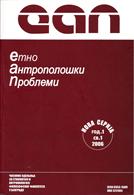Pojam "nevestnine" – prilog terminologiji bračnih davanja
The term nevestnina – A contribution to the terminology of matrimonial gift giving
Author(s): Vojislav StanimirovićSubject(s): Anthropology, History of Law, Semantics
Published by: Филозофски факултет, Универзитет у Београду
Keywords: bridal gifts; nevestnina; brideprice; bridewealth; price for a girl; farewell gift; mehr;
Summary/Abstract: This essay attempts to bring more order to terminology of matrimonial gift giving – the ever more complicated area in the past couple of decades. Furthermore, it reaffirms the idea of the evolution of matrimonial gift giving, and after many decades in which historians of law and ethnologists focused their research on particularities of matrimonial gift giving in certain cultures and epochs, points out the need of their systematization. Connecting history of law with ethnology, the author offers more precise references of the term brideprice, giving it back its usability, linking it with all the matrimonial gift givings the groom’s side presents to the bride’s father who possesses the exclusive authority to handle it as he pleases. On the other hand, the paper emphasizes the unjust disregard and neglect of another type of matrimonial gift giving in science, or perhaps its erroneous definitions by some authors. Namely, all those matrimonial gift giving from the groom’s side directly or indirectly intended for the girl herself. Girl’s father no longer controls the matrimonial gift giving and he bestows most or all of it to the girl on the wedding. It is what girl brings into marriage under the veil of trousseau, and later partially of dowry. Later on, these symbolic matrimonial gift givings were no longer given to girl’s father not even symbolically, but rather went straight into her hands. These new matrimonial gift givings can no longer be assigned to a category of buying the bride, while the term indirect dowry proposed by Goody is inappropriate for it creates a false picture of these matrimonial gift givings. That is why, in the absence of an appropriate name, the author took the liberty of coining the term nevestnina to cover both aspects of these matrimonial gift-giving. The term bridewealth used in the English speaking areas to replace the politically incorrect term brideprice is proper for the term nevestnina. For the later variation of this matrimonial gift-giving author suggested the expression farewell gift. The author illustrated the evolution of this matrimonial offering by Arabic mehr. It is by this example that the importance of theoretical framework of any matrimonial gift-giving analysis is pointed out, because mehr had three forms throughout its history keeping its name in the process. In addition, the necessity of an extensive cooperation between ethnology and history of law is also underlined, for only by exchange and synchronization of the results achieved, by respecting both views of the history of marriage more quality abstractions can be done, so a more gradual and a more precise picture of the evolution of matrimonial gift-giving can be presented.
Journal: Етноантрополошки проблеми
- Issue Year: 1/2006
- Issue No: 1
- Page Range: 125-154
- Page Count: 29
- Language: Serbian

